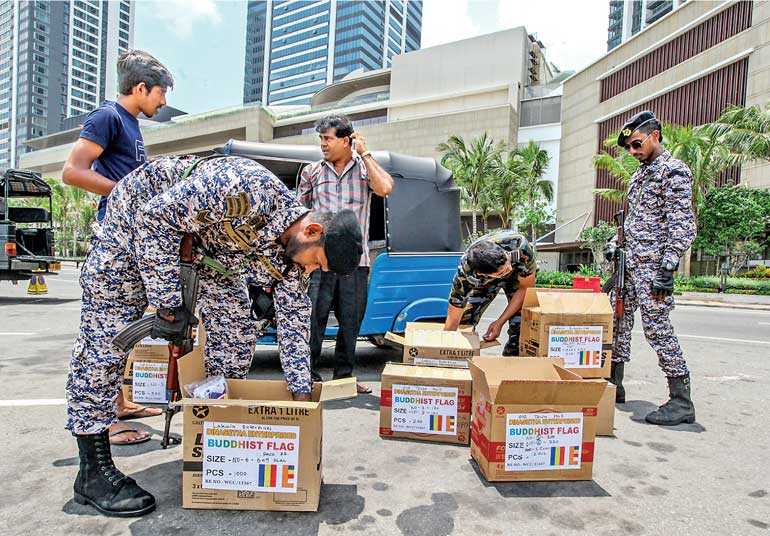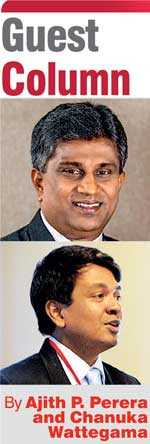Saturday Feb 14, 2026
Saturday Feb 14, 2026
Friday, 26 April 2019 00:00 - - {{hitsCtrl.values.hits}}

One of the first moves the Government considered after the 21 April tragic events of coordinated Easter Sunday bombings of churches and hotels in Colombo, Negombo and Batticaloa was a temporary block of social media. There was no debate about requisite. It was a collective Cabinet decision. President Maithripala Sirisena, overseas then, immediately gave his approval. 
Not all political decisions can be popular, but what needs to be done, should be done at right moment. After an inevitable but brief delay – there is no single switch to put off social media sites at once, we have to go through the tedious process of informing operators and waiting till they bring down one channel after another – we experienced the blackout in early afternoon hours.
Any policy decision could lead to favourable as well as unfavourable outcomes. One can bring countless arguments against this decision. True, prima facie, it infringes the rights of opinion and expression. It also bars the much needed communication in the immediate aftermath of a disaster.
Everyone desires to let loved ones know about their own safety. (Yes, we all agree blocking social media following a tsunami is a bad idea.) Rumours can mushroom at unbelievable agility. There is also a business aspect. The bulk of Sri Lanka’s internet use is for social media. Following the temporary block operators reported a sharp drop amounting to 30-40% of aggregate traffic. It involves a financial loss.
Our thinking: The negative outcome that could have been of not enforcing a block could easily trounce all such positives. In retrospect, it is easier to argue for rather than against above reasons. Those were what we actually saw. We never know what would have happened had there been no temporarily block. It is only a counterfactual speculation. We can only assume that has prevented a grave situation, otherwise would have happened.
In such circumstances, we are happy that others saw our point in doing that. We couldn’t have put it better than Kara Swisher, an opinion writer to NY Times, who wrote:
“When the Sri Lankan Government temporarily shut down access to American social media services like Facebook and Google’s YouTube after the bombings there on Easter morning, my first thought was ‘good’. Good, because it could save lives. Good, because the companies that run these platforms seem incapable of controlling the powerful global tools they have built. Good, because the toxic digital waste of misinformation that floods these platforms has overwhelmed what was once so very good about them. And indeed, by Sunday morning so many false reports about the carnage were already circulating online that the Sri Lankan Government worried more violence would follow.”
Of course, she wasn’t alone. Ian Bogost, an American academic and a contributing editor reinforced the argument in ‘The Atlantic’:
“Never before in human history have billions of people had direct access to one another in real time. Never before have governments had to preside over the instantaneous influx of media across their borders. Never before have corporations, no matter their wealth, had to address such a disparate and diverse set of people. Mark Zuckerberg has always called Facebook a ‘community,’ but it isn’t and never was one. It intersects with communities — millions of them — and it creates thousands of others within its virtual walls. It’s easy to scorn the Sri Lankan Government for censoring social media after the Easter attacks, an act that would be both illegal and impossible in the United States. But it’s also difficult to argue that a free flow of information has been an unalloyed good for that country, or the region.”
We are reluctant to label social media with the antiquated cliché ‘double-edged sword’. They are far more complicated to be stereotyped like that. So complicated that we still could not fully fathom their behaviour. That said, it could be an easy way to explain matters to a layman. Perhaps the more commonplace Sinhala term ‘vandurekuta delipigiya dunna vage’ (giving a razor blade to a monkey) explains it better. Social media, like AK 47s are for rational individuals, not for monkeys. In the hands of monkeys they can be a destructive tool. A very destructive tool. We have already witnessed how grievously it has been used in previous occasions.
The imperative question is what we, as a society, can do about it. Blocks are temporary solutions. We cannot prolong them for may be few days or maximum – in an extreme case – two or three weeks. That is the point when the losses outweigh the benefits.
Social media is essential to certain businesses. We will not be doing any favours to already badly affected Sri Lanka’s tourism industry by shutting down a channel they effectively use for international advertising. Neither would we be doing favours for the telecom industry by seriously limiting Internet usage. No matter how essential they were in short term, the temporary block must go once the dust settle down. We need long term and more sophisticated solutions, not blunt quick fixes like data blackouts.
Well, to some extent we have already been experimenting with few such measures. We work together with Facebook authorities to control hate speech – particularly religious orientated. Facebook has fortified its user registering policies to discourage fake profiles – a menace we have been fighting from its introduction to Sri Lanka more than a decade back.
Sri Lanka Computer Emergency response Team (SL-CERT) that comes under the purview of Ministry of Digital Infrastructure and Information Technology maintains close links with social media firms, particularly Facebook. CERT accepts local complaints and promptly addresses them with the technical assistance of the latter. In addition to SL-CERT, Information and communication Technology Agency (ICTA) too conducts frequent user awareness workshops on the proper use of social media.
Whether these measures are adequate is an entirely different matter. Social media propagates at an unprecedented speed and complexity. Its issues also grow with an equally exponential pattern. So right now nobody would be able to offer prefect solutions. We have to take the issues when they emerge. After all, this is not like solving energy or transport problems. In those cases we have some idea about the sizes and repercussions of the problems. In case of social media, we have little idea what would happen tomorrow.
It is not typical to end one newspaper column from an extract of another, but we break that tradition by selecting the following from Bogost’s as it so closely matches our views.
“Social media are but one part of complex sociopolitical circumstances that demand more deliberate action. Calls for regulation of Facebook, YouTube, and others are really just desperate pleas from people on the ground everywhere, from Sri Lanka to New Zealand, for these global services to work as local ones too. That’s a complex challenge. It doesn’t just involve bowing to local wishes, as risks in Sri Lanka, China, and elsewhere attest. But it does demand a lot more than just better monitoring for hate speech, false news, or incitements to violence, as Facebook promised to do in Myanmar, and after the Christchurch shooting, after the reports of Russian-election interference, and countless other times.”
Understanding the issue correctly, we think, is the first step towards finding solutions.
(Ajith P. Perera is the Minister of Digital Infrastructure and Information Technology and Chanuka Wattegama is a business writer.)